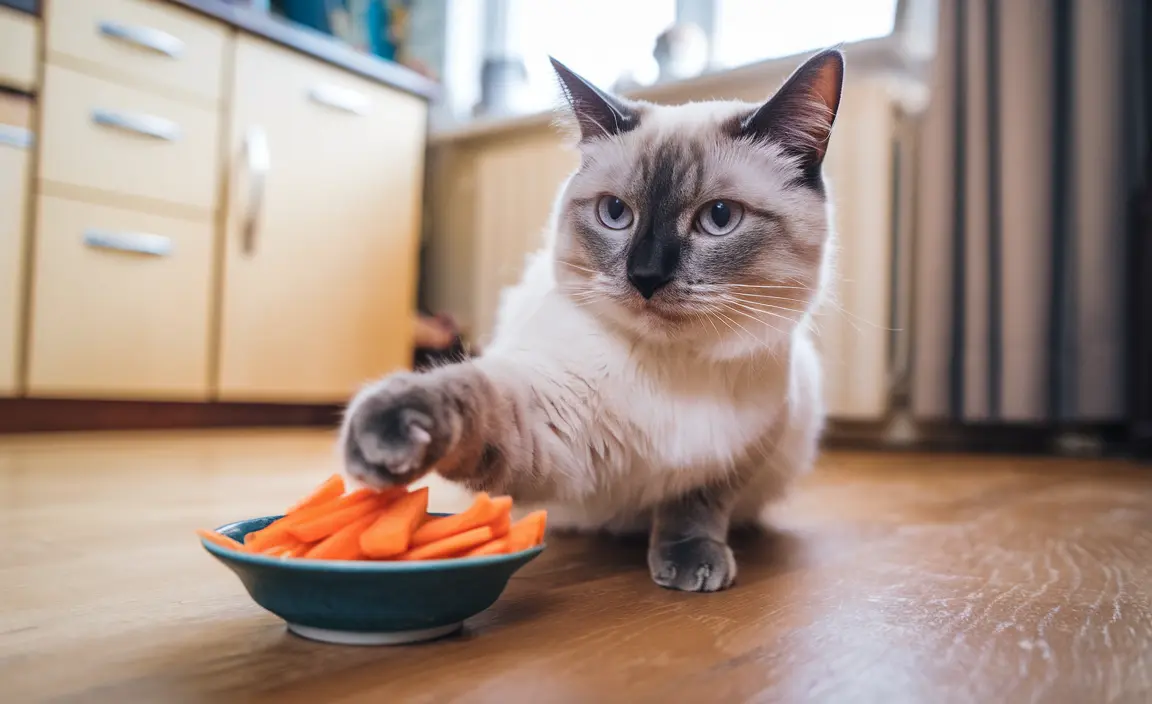As a cat owner, you might wonder about expanding your feline friend's diet beyond traditional cat food. While cats are obligate carnivores, certain vegetables can provide surprising nutritional benefits when introduced carefully. Understanding which vegetables are safe and how to incorporate them can support your cat's overall health and well-being.
This guide will explore the world of cat-friendly vegetables, offering expert insights into nutritional advantages, preparation methods, and essential safety considerations.
What Vegetables Are Good for Cats: Nutritional Highlights
Carrots: A Vitamin-Packed Treat
Carrots are more than just a crunchy snack for humans. When properly prepared, they offer cats significant nutritional advantages:
- Rich in vitamins A, K, and E
- Contains potassium and manganese
- Supports eye health through antioxidants
- Must be thoroughly cooked and cut into small pieces
- Serve without seasonings to prevent digestive issues
Green Beans: Low-Calorie Nutrition Boost
Green beans emerge as an excellent vegetable option for cats, especially those managing weight. Their nutritional profile includes:
- Low in calories
- High in dietary fiber
- Packed with vitamins A, K, and E
- Provides folate, calcium, and iron
- Ideal for cats needing weight management
- Always serve cooked and chopped
Pumpkin: Digestive Health Support
Pumpkin isn't just a seasonal favorite—it's a remarkable digestive aid for cats. Its high fiber content can help regulate intestinal health, providing relief from both constipation and diarrhea.
Preparing Vegetables for Cats: Essential Safety Tips
Cooking and Preparation Guidelines
Not all vegetable preparation methods are created equal when it comes to feline nutrition. Follow these critical guidelines:
- Always cook vegetables (steam, boil, or bake)
- Avoid adding salt, seasonings, or oils
- Cut into small, manageable pieces
- Introduce new vegetables gradually
- Monitor for potential allergic reactions
Portion Control and Frequency
Remember that vegetables should complement, not replace, your cat's primary protein-based diet. Experts recommend treating vegetables as occasional supplements, comprising no more than 10% of their total dietary intake.
Potential Risks and Precautions
Vegetables to Strictly Avoid
Some vegetables can be toxic or harmful to cats and must be completely avoided:
- Onions
- Garlic
- Raw potatoes
- Any member of the allium family
Special Health Considerations
Cats with pre-existing health conditions like kidney disease or urinary tract issues require extra caution. Always consult your veterinarian before introducing new foods, especially for cats with specific health challenges.
Frequently Asked Questions
What vegetables are safe for cats to eat and provide nutritional benefits?
Safe vegetables include carrots, green beans, peas, zucchini, broccoli, and pumpkin. Each offers unique nutritional advantages when prepared correctly.
How should I prepare vegetables for my cat to ensure they are safe and digestible?
Always cook vegetables thoroughly, remove any seasonings, cut them into small pieces, and introduce them gradually. Steaming or boiling are recommended preparation methods.
Are raw vegetables like carrots or spinach okay for cats, or do they need to be cooked?
Cats should always be served cooked vegetables. Raw vegetables can pose choking hazards, contain harder-to-digest fibers, and may harbor harmful bacteria.
Can cats with kidney or urinary issues safely eat vegetables like spinach or green beans?
Cats with kidney or urinary tract problems should consult a veterinarian before adding new vegetables to their diet. Some vegetables, like spinach, might exacerbate certain conditions.
What vegetables are toxic to cats and should be avoided entirely?
Cats must never consume onions, garlic, chives, or other allium family vegetables. These can cause serious health complications and should be completely eliminated from their diet.
By understanding your cat's unique nutritional needs and approaching vegetable introduction thoughtfully, you can provide occasional, beneficial dietary variety that supports their overall health.






